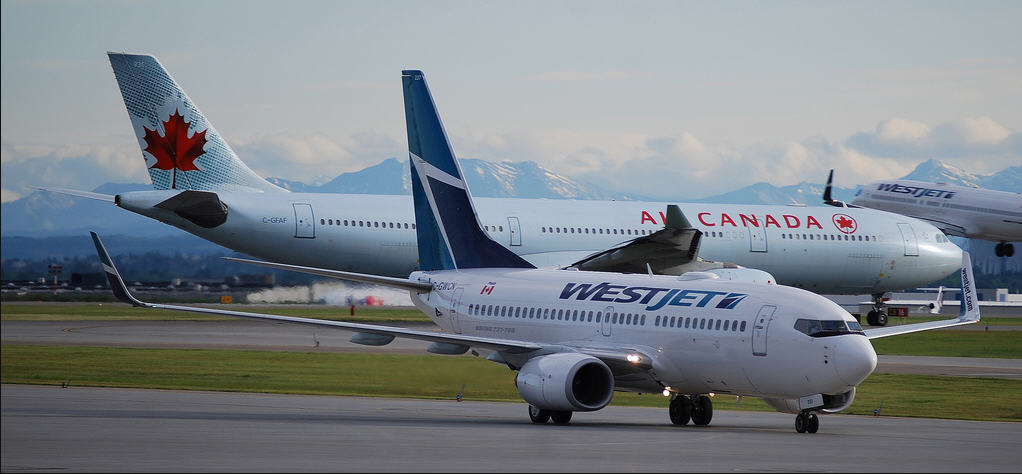Canada’s Largest Airlines are Converting to Cargo
Canadians are certified online shoppers. The country is the tenth most profitable market for eCommerce, with a revenue of US$35 billion in 2021. Canada’s three largest airlines are catching up fast.
Westjet and Air Canada, which have seen negative figures during the lockdowns, are swiftly establishing all-cargo divisions, as logistics contributes to long-term profitability.
Meanwhile, Cargojet is also hugely expanding its fleet after announcing a major contract renewal with DHL Express.
The growing fleets provide increased intra-Canada and cross-border capacity for e-commerce, pharmaceuticals, perishable goods, and general products for domestic and international shippers.
Air Canada
The country’s flag carrier is the first to return to a combination passenger-and-freighter fleet, dedicating aircraft to carrying freight on the main deck. The largest airline by fleet size also plans to invest in more all-cargo aircraft.
During an Investor’s Day presentation on March 30, Vice President of Cargo Jason Berry declared that the airline is going beyond eight cargo jets with six additional airlines within a year. The acquisition of two new factory-built Boeing 767-300 freighters is underway. They will supplement the eight 767-300s that were converted for cargo operations.
The 767-300 freighters allow five different main deck configurations, increasing the overall cargo capacity of each aircraft to nearly 64 tons.
Air Canada started flying its second converted freighter in April, launching service six times per week between Halifax and Toronto. Flights from Halifax carry fish, lobster, pharmaceuticals, aerospace parts, and more.
Israel Aircraft Industries is in charge of remodeling the older Air Canada passenger jets to carry heavy freight.
The airline shared an expanded schedule for its fledgling freighter network.
• To Frankfurt, Germany: Two flights weekly
• To Cologne, Germany: One flight weekly
• To Istanbul, Turkey: One flight weekly
• To Madrid, Spain: Three flights weekly from Toronto and Halifax
The airline’s efforts proved successful, increasing cargo revenue by 42% year-over-year to CA$398 million (US$310.3 million) thanks to strong demand in the Asia-Pacific region.
Cargojet
The country’s leading provider of time-sensitive overnight air cargo services is investing in eight Boeing 777 passenger planes that will be converted to a pure cargo configuration, quadrupling its original order. The new units are scheduled for delivery between 2023 and 2025.
The all-cargo airline, which carries over 1,300,000 pounds of cargo each business night, took a step into larger aircraft in November when it announced the upcoming acquisition of two 777-200s. The units will be converted by Mammoth Freighters, a Florida-based startup.
The long-range aircraft will pave the way for Cargojet to cater to increased intercontinental traffic.
The initial batch of four planes will be available by early 2024 and is already reserved for DHL Express. The remaining four planes also have interested parties and block allocation agreements.
Cargojet raised $365 million last year from a stock offering to rapidly grow its fleet. The company currently operates 31 dedicated freighters, two-thirds of which are medium widebody 767s. The rest are Boeing 757s, a large narrowbody aircraft.
Another shareholder letter says Cargojet has purchased six additional 757 aircraft. Five will be available this year, while the remainder will be delivered in 2023, following retrofitting.
Canada’s largest all-cargo airline also purchased six 767-300 aircraft, half of which will be converted this year and the other half in 2023.
By year-end, Cargojet will have 39 aircraft in its fleet and the figure will grow to 47 by the end of 2024.
WestJet
The country’s second-largest airline is joining the bandwagon. The Calgary-based carrier expects its first two 737-800 standard jets converted for cargo in revenue service by July 1.
WestJet Cargo intends to begin with limited charter work operating from a base at Toronto Pearson International Airport. Then, transition to regular, scheduled flights between major cities within Canada.
Finally, it can blend in ad hoc charters and transborder flying to the United States and the Caribbean, most likely on weekends and off-peak seasons.
The carrier is in talks with some potential customers such as integrated parcel logistics companies.
Westjet takes a conservative approach utilizing the 737-800 freighters to make sure it can deliver reliable performance.

